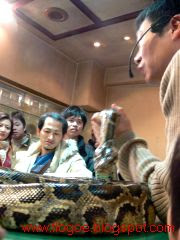
Long before the Han Chinese settled on the island of Taiwan there were already people living here. The situation can probably to some extend be compared to the colonization of Northern America, where also long before the Europeans arrived Natives were living.
And also the situation can be compared I guess. The natives have a lot of problems in their daily lives, are the outsiders of the normal society, followed by a lot of alcohol and unemployment problems.

There are some different tribes living through-out the island. The largest of them is the tribe of the A-mei, the smallest is not even consisting of a lot more then 10 people any more.
A special characteristic of the Natives´ society is ( I am actually not sure whether that is true for all the tribes, at least for the A-mei it is) are maternal societies. In contrast to the patriachic society of the Han Chinese.

That results in interesting findings when travelling there: When we were driving there were road constructions, a group of men of women could be seen. But there was one thing striking us immediately: The women were holding the tools and working on the pavement, the men were sitting, chatting and enjoying the day. We asked our driver immediately, who told us that this is due to the society. Men take care of the children and the household, women carry the burden to feed the family. There was nothing weird going on on that road construction, not in A-mei terms.

Another interesting experience was due to the Chinese language. Where you have to terms for saying "to marry". One for the male part, which is 娶 and has the meaning of taking someone else (the woman in one`s household) and the female part 嫁 (which means to leave the elderly household and become part of the husband`s family`s household). In the A-mei society the whole terminology is turned around. So, when I was wandering around on the campus of a school and talked to some of the school kids, on girl asked her friend: "你要不要娶他?" ("Do you want to take him to your household?"), a situation that made me smile and just expressed how much our societies are depending on cultural backgrounds and the way we grow up.


There are some different tribes living through-out the island. The largest of them is the tribe of the A-mei, the smallest is not even consisting of a lot more then 10 people any more.
A special characteristic of the Natives´ society is ( I am actually not sure whether that is true for all the tribes, at least for the A-mei it is) are maternal societies. In contrast to the patriachic society of the Han Chinese.

That results in interesting findings when travelling there: When we were driving there were road constructions, a group of men of women could be seen. But there was one thing striking us immediately: The women were holding the tools and working on the pavement, the men were sitting, chatting and enjoying the day. We asked our driver immediately, who told us that this is due to the society. Men take care of the children and the household, women carry the burden to feed the family. There was nothing weird going on on that road construction, not in A-mei terms.

Another interesting experience was due to the Chinese language. Where you have to terms for saying "to marry". One for the male part, which is 娶 and has the meaning of taking someone else (the woman in one`s household) and the female part 嫁 (which means to leave the elderly household and become part of the husband`s family`s household). In the A-mei society the whole terminology is turned around. So, when I was wandering around on the campus of a school and talked to some of the school kids, on girl asked her friend: "你要不要娶他?" ("Do you want to take him to your household?"), a situation that made me smile and just expressed how much our societies are depending on cultural backgrounds and the way we grow up.












